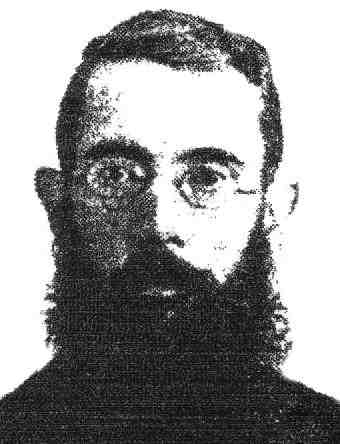

Visiting the village of Villandry, you can see at the six rue Emile Peltier a commemorative tablet stipulating:
Here was born Emile Peltier, pioneer of the Esperanto.. Let.s discover together this man.s life:
Emile Peltier was born in 1870, the 20th of September in the French village of Villandry, in Indre et Loire. He lived in the village's center, just a step from the church. He had a simple and working youth, surrounded with the feverish activity of the craftsmen and workers of time: basket maker and blacksmith, laundresses and farmers very requested by the needs of the castle and of his numerous farms.
Very young, he showed a big devotion, participated dedicatedly in the masses and entered the seminary of Tours at fourteen. Gifted for the studies, and particularly for the languages, he learned English and german then assimilated very correctly Spanish, Italian and Portuguese. On may, 1893 he was ordered priest. His linguistic knowledge made him name professor and it is in this profession that he translated and published several literary works.
The abbot Peltier, as a perfect linguist, was interested in Zamenhof works and in his international language, the Esperanto.. He was an active and visionary pioneer within a church which was searching for an auxiliary language able to unite catholics of all nations. And so was born .Espero Katolika., and this is for this cause that the abbot Emile Peltier will fight with doggedness during a too short life. He founded a magazine and threw out new ideas: that all Catholics, Protestants, Hebrews and Russian orthodoxes unite themselves by the Esperanto to work together on the universal brotherhood.. We were in 1905, and maybe he anticipated the horrors of the conflicts to come.
His delicate health did not resist to so many works, but he got the satisfaction to be allowed by the Pope to preach in Esperanto from 1906 and until his death, February 17th, 1909. The pioneer he was went out, living what he hopped to be the foundations of a more brotherly society which can henceforth free itself from the yoke of the languages. The two world conflicts gave rightly and international ascendancy to the English, what did not allow the Esperanto to take the place which returned to its and so made the Europe lose the exceptional luck to adopt a simple language, facilitating its union.
( Source : Biographie d'E. Peltier écrite en espéranto par N.G. Hoen et traduite par R. Boré )
Thanks to G. Lhuissier and A. Ancrenaz
http://Villandry.free.fr